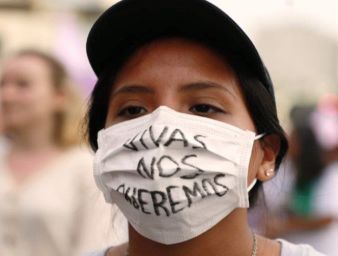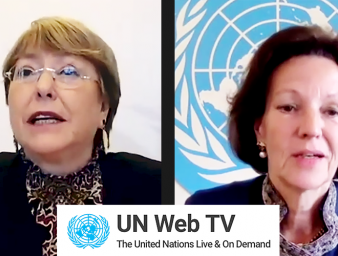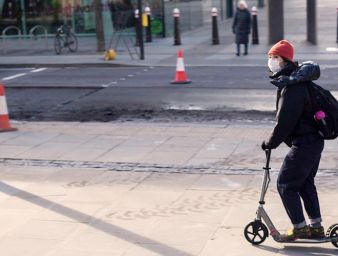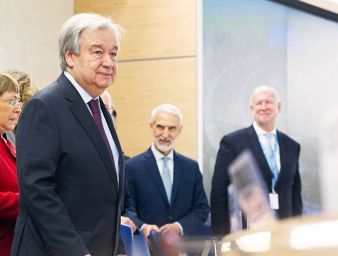Vulnerable groups in Serbia facing deeper discrimination due to COVID-19
27 May 2020

When COVID-19 arrived in Serbia on 6 March 2020, a state of emergency was declared one week later. Since then, a number of human rights concerns have been raised, particularly surrounding the unequal access of vulnerable groups to healthcare and social protection.
At the time of writing, 11,193 cases have been officially recorded in Serbia, and 239 people have died (source: World Health Organization).
Milan Markovic is the Head of UN Human Rights in Serbia.
What are the main human rights issues at stake in Serbia in the COVID-19 response?
The major concern is that the already existing gaps or inequalities are now being exacerbated. This leads to greater divide, and even wider discrimination. Certain lockdown measures are affecting the most marginalised and the most vulnerable.
They are being left behind more than ever before as a result of confinement and a partial freeze of the system. Although the health response and restrictive measures have had an impact - with low infection and mortality rates - they have had a direct negative impact on the rights of several groups and the increase of risks they face.
In Serbia, we’re concerned for a number of groups: Roma, people with disabilities, and LGBTI people all have an unequal access to social protection and healthcare. Women are at greater risk of domestic and gender-based violence, with lockdown measures meaning they cannot leave their house. We’re also concerned for migrants and refugees. Others, such as people with mental disabilities, are unable to leave the premises where they reside, or even go into their backyard. And people in detention are enduring overcrowded and cramped conditions, making them more vulnerable to the spread of the virus.
What is UN Human Rights doing to protect the rights of people during this pandemic?
We are closely following all the measures adopted under the state of emergency and monitoring the human rights impacts of this. Are they considered proportionate in line with the situation and how do they affect particular groups? This is a constant question we ask ourselves, and we advocate accordingly with the government.
Also crucial to our work is our collaboration with local organisations and individuals who work on human rights. They help us secure first-hand data and information, and also aid us in our advocacy efforts. Direct cooperation with the Government has also been the best platform to address several mitigation measures under the state of emergency.
We are mapping the immediate needs of the most vulnerable groups, looking at issues such as access to healthcare, water, housing and electricity. We then provide this information to the government and other organisations assisting in the response, to inform their activities.
One of our main objectives during this crisis is to put human rights at the centre of the response and the upcoming recovery period. We’re working with the UN system, the government and other development partners to ensure human rights are not forgotten at this critical time in history.
How has COVID-19 affected your work?
Working in isolation at home has been very intensive. We are a team of six and we are working approximately ten to twelve hours a day.
For me and many others, there is little or no separation between work and home life and that is trying, to say the least.
But we’re doing our best, and everyone is in the same situation. What is challenging is the fact that all of the partners we usually work with are all at home as well, so the flow of information can often be compromised and we do not, for the most part, have direct access to rights-holders. The main lesson we have learned therefore is how to be creative and accessible during these difficult circumstances. We need to adjust to this ‘new normal’ without compromising the outcome: the protection and promotion of human rights.
Biggest challenges and lessons learned thus far during the pandemic?
This has been an enormous learning experience, especially in keeping the unique mandate that UN Human Rights has in the field: to ensure that human rights are not forgotten even in these restrictive times and in states of emergency across the globe.
During this crisis, it’s critical to be very, very quick on our toes. The situation is constantly changing, so we need to adapt and react, often in the same hour that we hear of a new development. Nothing can be left undone or left until later, when human rights are so at stake amidst this pandemic. One of the biggest risks is that, once the restrictions are lifted, we lose the attention on the groups and individuals most affected by structural neglect.
Why is it important to stand up for human rights during this pandemic?
It’s our ‘business as usual’ to ensure human rights are at the centre of the UN response. Regarding the response to COVID-19, we’ve seen that the response is not only about saving lives, it’s about saving human dignity. Without incorporating the basic principles of non-discrimination, equality and human dignity into the response to this crisis, we will never do it justice and people will, most certainly, be left behind.
Standing up for human rights keeps human dignity alive, secured and protected.
27 May 2020




